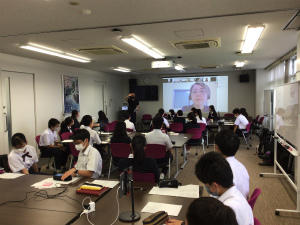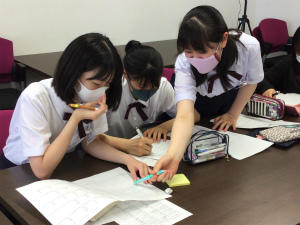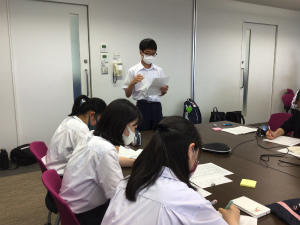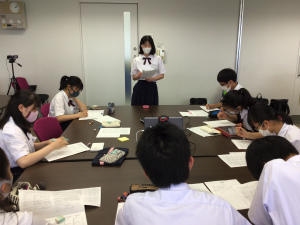
グローバル教育
2021年度第1回即興型英語ディベート
2021/06/21
On June 19th (Sat.), the first English Parlimentary Debate Association (PDA) session was held. In each session, the students recieve a point of advice for debating from the main PDA staff member and judge. Then, they take part in two debates and are judged by official PDA judges. After each debate they each receive individual feeback from their group's judge. Finally, all students receive general feedback, this time about using more concrete examples, and complete a self-reflection questionnaire.
This time, first debate motion was "High school students should have part-time jobs" and the second was "Japan should accept more foreign refugees." We divided the students into three tables with each table having a Government Team (for the motion), an Opposition Team (against the motion), and student-judges. This year, there are several experienced debaters returning from last year, so they were spread across all the tables and able to help beginners.
The Global Research Division staff members were very impressed by these opening rounds. Good points observed were:
- Following the advice given at the start of the session and using "signposts." These are short, clear outlines and summaries of ideas to help the other team and judges easily follow the speaker's ideas.
- Many student spoke in loud voices with eye contact and gestures. This made it very easy to follow debates and gave the impression of confident speakers.
- Both experienced and beginner students generally spoke for a long time and several members reached the maximum time limit for their part of the debate. The implication is that were explaining in more detail.
- There were several Points of Interest (POI) on each debate table. POIs are when the team currently listening team attempts to interrupt the speaker to clarify what is being said or to attack it. In particular, using POIs to attack is a powerful tactic in parlimentary debate, so seeing this happen in the first debate session was an encouraging sign that we will have a very activity group of debaters this year.
In their self-reflection questionnaires, many students wrote that they want to use more concrete examples in their next debates. Also, many said that they want to deal with POIs more smoothly.
Overall, this was an excellent start to the year's debating. Well done!




